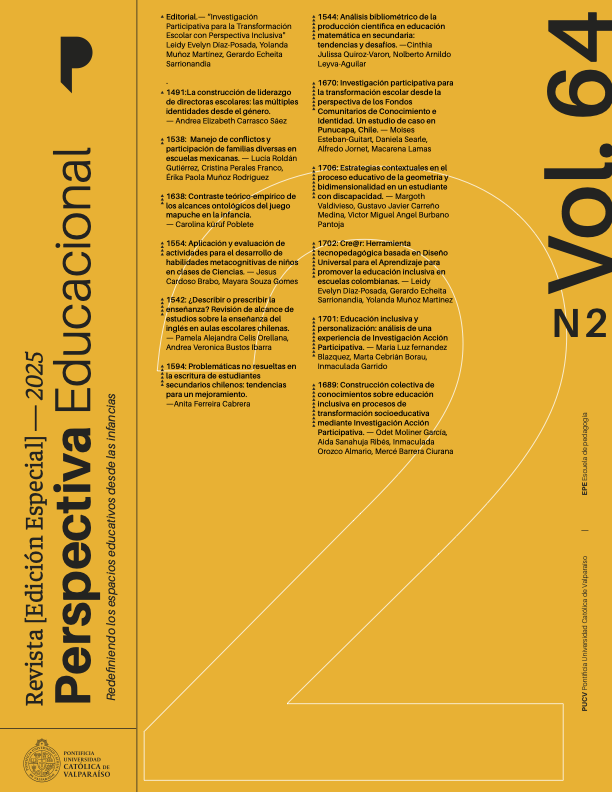Describing or Prescribing Teaching? A Scope Review of Studies on English Teaching in Chilean School Classrooms
DOI:
https://doi.org/10.4151/07189729-Vol.64-Iss.2-Art.1542Keywords:
English language teaching foreign language speaking skill teaching professionAbstract
The persistent low performance of students in national standardization assessments, the pressing need for innovation, and the scarcity of recent studies evaluating the impact of proposed initiatives to enhance student achievement underscore the necessity of a meticulous inquiry as a means to delve into the internal dynamics of the classroom. To explore the current state of English language teaching in Chile, a fundamental and pertinent research question is proposed to facilitate advancement: What type of knowledge can be systematized from applied studies conducted in Chile between 2017 and 2022 regarding English teaching practices aimed at developing linguistic skills as a foreign language?
This study undertook a scoping review following the Prisma-ScR framework to map the body of research concerning English language teaching within school contexts in Chile. This methodology enables the collection of reliable and valid data while simultaneously assessing the quality of existing knowledge that can inform future investigations (Manterola et al., 2023). The aim of this scoping review is to classify and synthesize the available evidence from studies on English language teaching, distinguishing between knowledge concerning practice (descriptive) and knowledge concerning what should be taught (prescriptive). This analysis seeks to assess the level of theoretical advancement in English language teaching in Chile, particularly regarding the development of linguistic skills and the implementation of the communicative approach that underpins the national curriculum’s plans and programs. Such an assessment is essential to understand the state of English language education in the years following the disclosure of poor outcomes in the 2017 national evaluation.
This led to the main conclusion, which identifies the ongoing challenge of advancing a deeper understanding of what "actually occurs" in classroom settings. The scarcity of detailed studies on pedagogical practices within school contexts, coupled with students’ low performance in national assessments, highlights the pressing need for comprehensive investigations into the unexplored factors influencing student achievement.
Given the limited number of studies addressing pedagogical practices, it is important to consider the inconsistencies between practical knowledge and knowledge about practice: teachers’ perceptions of possessing strong pedagogical expertise and their positive appraisal of fundamental practices aligned with the communicative approach are contrasted by the high valuation of grammar instruction and the frequent use of translanguaging as a central practice in the context of teaching English as a foreign language. This discrepancy reveals a critical area for research in both initial and continuing teacher education, aiming to interrogate and respond to the documented evidence presented in other studies (Karatas et al., 2024; Kaya, 2019).
In summary, consolidating systematic evidence on the practice of teaching linguistic skills in English is crucial to achieving a clearer understanding of the challenges associated with innovation in this field.
References
Aedo, P., & Millafilo, C. (2022a). Increasing vocabulary acquisition and retention in EFL young learners through the use of multimodal texts (memes). Colombian applied linguistics journal, 24(2), 251-269. https://doi.org/10.14483/22487085.18312
Aedo, P., & Millafilo, C. (2022b). What type of oral corrective feedback do Chilean EFL young learners prefer? How, 29(2), 81-100. https://doi.org/10.19183/how.29.2.643
Agencia de Calidad de la Educación. (2019). Estudio Nacional Inglés 2017. Ministerio de Educación. http://archivos.agenciaeducacion.cl/ppt_ingles_III_medio.pdf
Agencia UPI. (2011, 24 de marzo). Lavín anuncia Plan Nacional de Inglés que incluye programas en la TV abierta. BioBioChile. https://www.biobiochile.cl/noticias/2011/03/24/lavin-anuncia-plan-nacional-de-ingles-que-incluye-programas-en-la-tv-abierta.shtml
Barahona, M. (2020). The potential of translanguaging as a core teaching practice in an EFL context. System, 95, Article 102368. https://doi.org/10.1016/j.system.2020.102368
Barahona, M., & Davin, K. J. (2021). A practice-based approach to foreign language teacher preparation: A cross-continental collaboration. PROFILE Issues in Teachers Professional Development, 23(1), 181-196. https://doi.org/10.15446/profile.v23n1.85326
Barahona, M., & Toledo, F. (2022). Exploring Chilean EFL student teachers’ development of teacher identity through perezhivanie. Journal of Language, Identity & Education, 1-16. https://doi.org/10.1080/15348458.2022.2075875
Barger, C., & Sandoval Rubilar, P. (2020). Language orientations of Chilean secondary students in relation to the study of English as a foreign language. Colombian applied linguistics journal, 22(2), 142-156. https://doi.org/10.14483/22487085.15554
Bezmalinovic, H. S., Goizueta, M., Montaner, S. H. (2022). Emergencia de patrones de interacción al promover la argumentación en el aula de matemáticas. Educación Matematica, 34(3), 132-162. https://doi.org/10.24844/EM3403.05
Brevis-Yéber, M., Mas-Torelló, Ó., & Bueno, C. (2022). Práctica docente reflexiva como estrategia para el fomento de las innovaciones en los centros escolares. Logos (La Serena), 32(2), 269-287. https://dx.doi.org/10.15443/rl3216
Cancino, M., & Díaz, G. (2020). Exploring the code-switching behaviours of Chilean EFL high school teachers: A function-focused approach. PROFILE Issues in Teachers Professional Development, 22(2), 115-130. https://doi.org/10.15446/profile.v22n2.81152
Cancino, M., & Iturrieta, J. (2022). Assessing the impact of the Lexical Approach on EFL perceived oral proficiency: What is the role of formulaic sequences? Vigo international journal of applied linguistics, 19, 41-66. https://doi.org/10.35869/vial.v0i19.3759
Chow, B. W.-Y., Hui, A. N.-N., Li, Z., & Dong, Y. (2023). Dialogic teaching in English-as-a-second-language classroom: Its effects on first graders with different levels of vocabulary knowledge. Language Teaching Research, 27(6), 1408-1430. https://doi.org/10.1177/1362168820981399
Cisterna Zenteno, C., Díaz Larenas, C., Boundón Araneda, J., & Larenas, M. E. (2019). Conocimiento pedagógico del profesorado de inglés en Chile y su necesidad percibida de actualización. Actualidades investigativas en educación, 19(2), 1-26. https://doi.org/10.15517/aie.v19i2.37000
Connelly, M., & Clandinin, J. (1995). Stories of experiencie and Narrative inquiry. Leartes.
Contreras, A., Véliz-Campos, M., & Véliz, L. (2019). Portfolios as a strategy to lower English language test anxiety: The case of Chile. International Journal of Instruction, 12(1), 181-198. https://doi.org/10.29333/iji.2019.12112a
De la Barra, E., & Carbone, S. (2020). Bridging inequality: Cooperative learning through literature in two vulnerable schools in Santiago. PROFILE Issues in Teachers Professional Development, 22(2), 49-63. https://doi.org/10.15446/profile.v22n2.81384
Elston, A., Tiba, C., & Condy, J. (2022). The role of explicit teaching of reading comprehension strategies to an English as a second language learner. South African Journal of Childhood Education, 12(1), 1-10. https://doi.org/10.4102/sajce.v12i1.1097
Ferreira Cabrera, A., & Elejalde Gómez, J. (2020). Propuesta de una taxonomía etiológica para etiquetar errores de interlengua en el contexto de un corpus escrito de aprendientes de ELE. Forma y función, 33(1), 115-146. https://doi.org/10.15446/fyf.v33n1.84182
Flores, M., Gutiérrez, R., Rocha, F., Valenzuela, P., & Vilches, C. (2021). Improving English Vocabulary Learning through Kahoot! A Quasi-Experimental High School Experience. Teaching English with Technology, 21(2), 3-13.
Fullan, M. (2002). El significado del cambio educativo: un cuarto de siglo de aprendizaje. Profesorado. Revista de Currículum y Formación del Profesorado, 6(1), 1-14. https://recyt.fecyt.es/index.php/profesorado/article/view/41935
Glas, K., Dittmar, P., & Allendes, P. (2021). Guided by images—Chilean novice teachers’ visions of themselves. ELT Journal, 75(4), 451-459. https://doi.org/10.1093/elt/ccab021
González‐Fernández, B. (2024). How Is Vocabulary Learnt? An Acquisitional Sequence of L2 Word Knowledge. TESOL Quarterly. https://doi.org/10.1002/tesq.3342
Inostroza, M.-J. (2018). Chilean young learners’ perspectives on their EFL lesson in primary schools. Actualidades investigativas en educación, 18(1), 133-163. https://doi.org/10.15517/aie.v18i1.31323
Jorquera Torres, O. C., Mendoza Zapata, J. E., & Díaz Larenas, C. H. (2017). High school students’ affective reaction to English speaking activities. How, 24(2), 102-120. https://doi.org/10.19183/how.24.2.346
Karatas, S., Aksoy, B., Göçer, O., En, E., Çiftçi, S., & Caner, M. (2023). The power of the communicative approach: An investigation of classroom practices of English teachers working in vocational high schools. Psychology in The School 61, 2778-2799. https://doi.org/10.1002/pits.23191
Kaya, İ. (2019). Using the communicative approach in teaching Turkish as a foreign language in speaking skills at A1‐A2 level. Erciyes University Journal of Education, 21(2), 78-96.
Korthagen, F. A. (2007). The gap between research and practice revisited. Educational Research and Evaluation: An International Journal on Theory and Practice,13(3), 303-310.
Krashen, S. D., & Terrell, T. (1982). The Natural Approach. Elsevier.
Larenas, C. D., Boero, N. A., Rodríguez, B. R., & Sánchez, I. R. (2021). English language assessment: unfolding school students’ and parents’ views. Educação e Pesquisa, 47, Article e226529. https://doi.org/10.1590/s1678-4634202147226529
Lavalle, I., & Briesmaster, M. (2017). The Study of the Use of Picture Descriptions in Enhancing Communication Skills among the 8th- Grade Students--Learners of English as a Foreign Language. Inquiry in Education, 9(1), Article 4.
Lizasoain C., A., Ortiz de Zárate F., A., & Becchi Mansilla, C. (2018). Utilización de una herramienta TIC para la enseñanza del inglés en un contexto rural. Educação e Pesquisa, 44, Artículo e167454. https://doi.org/10.1590/s1678-4634201844167454
Lopez-Cortes, O. D., Betancourt-Núñez, A., Bernal Orozco, M. F., & Vizmanos, B. (2022). Scoping reviews: una nueva forma de síntesis de la evidencia. Investigación en educación médica, 11(44), 98-104. https://doi.org/10.22201/fm.20075057e.2022.44.22447
Manterola, C., Rivadeneira, J., Delgado, H., Sotelo, C., & Otzen, T. (2023). ¿Cuántos Tipos de Revisiones de la Literatura Existen? Enumeración, Descripción y Clasificación. Revisión Cualitativa. Revista Internacional de Morfología [International Journal of Morphology], 41(4), 1240-1253. https://doi.org/10.4067/s0717-95022023000401240
Martínez-Maldonado, P., Armengol Asparó, C., & Muñoz Moreno, J. L. (2019). Interacciones en el aula desde prácticas pedagógicas efectivas. Revista de estudios y experiencias en educación, 18(36), 55-74. https://doi.org/10.21703/rexe.20191836martinez13
McDonough, K., & Sato, M. (2019). Promoting EFL students’ accuracy and fluency through interactive practice activities. Studies in Second Language Learning and Teaching, 9(2), 379-395. https://doi.org/10.14746/ssllt.2019.9.2.6
McNamara, O. (2002). Evidence-based practice through practice-based evidence. En O. McNamara (Ed.), Becoming an evidence-based practitioner: A framework for teacher-researchers (pp. 15-24). Routledge.
Ministerio de Educación de Chile. (2011). Fundamentos Bases Curriculares 2011 Educación Básica. Gobierno de Chile. https://www.curriculumnacional.cl/614/articles-244568_recurso_pdf.pdf
Molina, M., & Briesmaster, M. (2017). The Use of the 3/2/1 Technique to Foster Students' Speaking Fluency. Inquiry in Education, 9(2), 1-13.
Muñoz Campos, D. (2017). Problem-based learning: An experiential strategy for English language teacher education in Chile. PROFILE Issues in Teachers Professional Development, 19(1), 29-40. https://doi.org/10.15446/profile.v19n1.53310
Muñoz-Hurtado, J. (2020). Productive Verbal Interactions in Classrooms With Children From Different Socioeconomic Backgrounds: An Empirical Study in Chilean Schools. Psykhe, 29(2). https://doi.org/10.7764/psykhe.29.2.1431
Ortiz-Neira, R. A. (2019). The impact of information gap activities on young EFL learners’ oral fluency. PROFILE Issues in Teachers Professional Development, 21(2), 113-125. https://doi.org/10.15446/profile.v21n2.73385
Pajares, M. F. (1992). Teachers’ beliefs and educational research: Cleaning up a messy construct. Review of Educational Research, 62(3), 307-332. https://doi.org/10.3102/00346543062003307
Robaina, Y. G., & Díaz Larenas, C. (2019). Propuesta de un Modelo Didáctico Basado en la Teoría y el Estado del Arte para Equilibrar Fluidez y Precisión en la Comunicación Oral en Inglés como Lengua Extranjera. Revista Educación, 44(1), 549-565. https://doi.org/10.15517/revedu.v44i1.36873
Sabri, A., Salleh, R., & Di Biase, B. (2021). Instructing Malaysian Children with HFASD in English as a Second Language. Asiatic: IIUM Journal of English Language and Literature, 15(1), 92-114. https://doi.org/10.31436/asiatic.v15i1.2312
Sáez Lantaño, A., Nocetti de la Barra, A. & Flores Lueg, C. (2022). El saber práctico del profesorado: una revisión sistemática de la investigación actual. Perspectiva Educacional, 61(3), 26-55. https://dx.doi.org/10.4151/07189729-vol.61-iss.3-art.1246
Sánchez, E., & Mena, J.-J. (2010). Hablamos de lo que no existe; y de lo que existe, no hablamos. Infancia y Aprendizaje, 33(2), 185-197. https://doi.org/10.1174/021037010791114661
Sato, M. (2017). Interaction mindsets, interactional behaviors, and L2 development: An affective‐social‐cognitive model. Language Learning, 67(2), 249-283. https://doi.org/10.1111/lang.12214
Sato, M., & Dussuel Lam, C. (2021). Metacognitive instruction with young learners: A case of willingness to communicate, L2 use, and metacognition of oral communication. Language Teaching Research, 25(6), 899-921. https://doi.org/10.1177/13621688211004639
Sato, M., & Oyanedel, J. C. (2019). “I think that is a better way to teach but …”: EFL teachers’ conflicting beliefs about grammar teaching. System, 84, 110-122. https://doi.org/10.1016/j.system.2019.06.005
Stenhouse, L. (1987). La investigación como base de la enseñanza. Morata.
Suzuki, Y., & Crowther, D. (2024). Addressing the Role of “Linguistic Knowledge” in Global Englishes Pedagogy. TESOL Quarterly. https://doi.org/10.1002/tesq.3343
Tagle, T., Díaz, C., Alarcón, P., Ramos, L., Quintana, M., & Etchegaray, P. (2021). Evaluación y Prácticas de estudiantes y profesores noveles chilenos en planificación y enseñanza. Revista de la educación superior, 50(198), 131-154. https://doi.org/10.36857/resu.2021.198.1704
Tamayo, M. (2001). El proceso de la investigación científica. Limusa.
Telles Quezada, N., Inostroza Araos, M.-J., & Rosas-Maldonado, M. (2019). Points of improvement: Reflective strategy to support Chilean EFL pre-service teachers’ lesson planning. How, 26(2), 88-105. https://doi.org/10.19183/how.26.2.498
Ulloa Salazar, G., & Díaz Larenas, C. (2018). Using an audiovisual materials-based teaching strategy to improve EFL young learners’ understanding of instructions. How, 25(2), 91-112. https://doi.org/10.19183/how.25.2.419
Videla, R., Leyton, G., & Rossel, S. (2024). Estrategias pedagógicas utilizadas por una profesora destacada en matemáticas: un estudio de caso en la IV Región de Chile. Cultura y Educación, 36(1), 134-165. https://doi.org/10.1177/11356405241235070
Yilorm, Y. A., Acosta, H., & Martinez, E. (2019). Desarrollo de la habilidad de comprensión auditiva de la lengua inglesa en estudiantes socialmente vulnerables. Atenas, 1(45), 69-82.
Yin, R. K. (2014). Case study methods: Design and methods. Sage.
Zapata, C. (2019). Corpus oral de estudiantes de inglés en Chile (esoc-Chile): Diseño, estructura y aplicaciones. Revista de lingüística teórica y aplicada, 57(2), 13-40. https://doi.org/10.4067/s0718-48832019000200013
Downloads
Published
How to Cite
Issue
Section
License
Copyright (c) 1969 Pamela Alejandra Celis Orellana, Andrea Veronica Bustos Ibarra

This work is licensed under a Creative Commons Attribution-ShareAlike 4.0 International License.
The authors grant an exclusive licence, without time limit, for the manuscript to be published in the Perspectiva Educacional journal, published by the Pontificia Universidad Católica of Valparaíso (Chile), through the School of Pedagogy.





